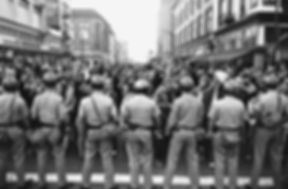
1963--Herbert Aptheker speaks at Stiles Hall
The UC Speaker Ban
In the late fifties and early sixties, the Regents forbade the use of University facilities to host controversial speakers, on the grounds that their views would accrue some of the prestige of that great institution. The Speaker Ban was based on two rules promulgated under the paternalistic presidency of Robert Gorden Sproul. Rule 5 said: "the University assumes the right to prevent exploitation of its prestige by unqualified persons or by those who would use it as a platform for propaganda." Rule 17 put control of all university facilities under duties of the president of the University of California. It said in part "In no circumstance shall any speaker ... be invited to address any meeting ... except upon invitation of the president or his direct representative." The President and his UC campus representatives relied on these rules to decide who could safely address the student body and faculty colloquia.
The role of Stiles Hall
Stiles Hall, the off-campus YMCA on Bancroft Avenue near the campus entrance, had developed into a refuge for "controversial" groups and speakers. The Y hosted numerous meetings of student groups , including the Campus Committee For Racial Equality (CORE), SLATE, the Young Peoples Socialist League (YPSL), the Young Socialist Alliance (YSA) and the University Friends of SNCC.
Herbert Aptheker is forced to speak off campus.
In the spring of 1962, the Graduate Student Colloquium of the UC Berkeley History Department attempted to get permission from the administration for a paid talk by Herbert Aptheker, an historian with a pHD from Columbia University. The request was denied, based on the Speaker Ban, because of Aptheker's open Communist Party membership.
Aptheker was the author of 50 books. Many were pioneering studies on slave revolts, a subject that had been rarely studied by historians. His Negro Slave Revolts in the United States 1526–1860 (1939), includes a table of documented slave revolts by year and state. His doctoral dissertation, American Negro Slave Revolts, was published in 1943. Doing research in Southern libraries and archives, he uncovered 250 episodes of slave resistance..
Although Aptheker's credentials were outstanding, he was denied access to academia during the anti-communist hysteria of the fifties and sixties. He became the Communist Party's chief theoretician and was a frequent spokesman for the Party. Upon the university's denial of the History Department's request, the Graduate Student Colloquium arranged for Aptheker to speak at Stiles Hall. His stipend of $40 was raised by taking up a collection from the audience. Putting that "small" fee in perspective, in 1961 the normal fee for a single university lecture was $50.
The UC Regents abolished the speaker ban on June 23, 1963 and Aptheker was again invited to speak on campus, which he did in late October, 1963, speaking on American foreign policy in Vietnam.
Aptheker was an impressive speaker. He was self-confident, articulate and forceful.

